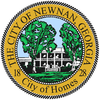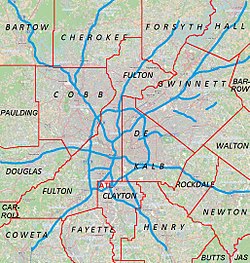Newnan
| Newnan, Georgia | ||
|---|---|---|
| City | ||
|
||
| Motto: City of Homes | ||
 Location in Coweta County and the state of Georgia |
||
| Location of Newnan in Metro Atlanta | ||
| Coordinates: 33°22′35″N 84°47′19″W / 33.37639°N 84.78861°WCoordinates: 33°22′35″N 84°47′19″W / 33.37639°N 84.78861°W | ||
| Country | United States | |
| State | Georgia | |
| County | Coweta | |
| Incorporated (city) | December 20, 1828 | |
| Area | ||
| • Total | 18.6 sq mi (48.3 km2) | |
| • Land | 18.3 sq mi (47.4 km2) | |
| • Water | 0.3 sq mi (0.9 km2) | |
| Elevation | 971 ft (296 m) | |
| Population (2015) | ||
| • Total | 41,109 | |
| • Density | 1,804/sq mi (696.5/km2) | |
| Time zone | Eastern (EST) (UTC-5) | |
| • Summer (DST) | EDT (UTC-4) | |
| Area code(s) | 770, 678 | |
| FIPS code | 13-55020 | |
| GNIS feature ID | 0332499 | |
| Website | ci |
|
Newnan is a city in Metro Atlanta and the county seat of Coweta County, Georgia, approximately 40 miles (64 km) southwest of Atlanta. The population was 41,109 at the 2010 census, up from 16,242 in 2000, for a growth rate of 153.1% over that decade.
Newnan was established as county seat of Coweta County (replacing the defunct town of Bullsboro) in 1828 and was named for North Carolinian General Daniel Newnan. It quickly became a prosperous magnet for lawyers, doctors, other professionals, and merchants. Much of Newnan's prosperity was due to its thriving cotton industry, which relied on slavery.
Newnan was largely untouched by the Civil War due to its status as a hospital city (for Confederate troops), and as a result still features much antebellum architecture. Celebrated architect Kennon Perry designed many of the town's 20th century homes. During the Atlanta Campaign, Confederate cavalry defeated Union forces at the nearby Battle of Brown's Mill.
Newnan was also host to the trial in 1948 of wealthy landowner John Wallace, the first white man in the south to be condemned to death by the testimony of African Americans, two field hands who were made to help with burning the body of murdered white sharecropper Wilson Turner. These events were portrayed in the novel Murder in Coweta County. The film version starred Johnny Cash, Andy Griffith, and June Carter.
...
Wikipedia


